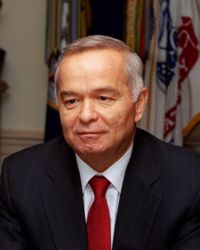Sultan Qasım-ulı

| |
| Title: | Ilxan of Turkestan |
| Term in office: | At Jılı 1991–present |
| Predecessor: | Raza İris Baı-ulı |
| Successor: | Current incumbent |
| Birth: | |
| Date: | 30- Qaņjar, Buqa Jılı 1937 (=30 January 1938) |
| Place: | Samarqand, Tajikistan |
| Profession: | Engineer, Politician, Head of State |
| Political Party: | originally listed as Progressive |
| Relgious Affiliation: | Assyrian Church |
Biography
Sultan Qasım-ulı Bii was born on 30th January 1938 (Year of the Ox 1937 in Turkestani reckoning). He is the son of a Tajik mother and an Üzbek father, and rose from humble status as a semi-orphaned child to his current eminence as Head of State of Turkestan.
Early Life & Career
Sultan was the only child of his parents Nayla Şarıdeh and Qasım Qun-ulı Bii. After his father's death in the Second Great War in 1944, Sultan had to virtually make his own way in the world. His mother sacrificed much for her son, enabling him to finish his schooling without needing to go out and find work. Unfortunately, this took its toll on her, and she too passed away only four years later (in 1961).
Sultan had to grow up very fast, and grew into his name; a natural leader with a sense of responsibility year ahead of himself and an ability to think and act independently without drawing attention to the fact. From the earliest, he seems to have been independent-minded and able to influence others, and also seems to have had the wisdom in the burgeoning Snorist regime to mostly hide just how independent his thought processes were.
His education was in one of the earliest modern Assyrian schools in Turkestan, and was, like many Assyrian-run educational establishments, weighted towards the sciences and engineering. His later education occurred in the transitional phase between the Russian "liberation" of the country in 1948 and the full establishment of the Government of National Unity, and was filled with mixed messages. Most teachers tended to keep their heads down and not make waves during this period; the Snorist regime did move quickly to infiltrate the classroom and ensure that the next generation were raised Snorists. After he finished school in 1957, he became an engineer. This was a relatively "safe" field politically; the new regime was desperate for anyone with technical knowledge, and Sultan was promoted fairly quickly to a senior engineering post.
However, Sultan Qasım-ulı lacked tonış, an Üzbek word meaning "connections" or "patronage", and was passed over for promotion to a management position again and again. In 1979, he left the engineering profession and used his father's title of Bii to gain himself a position in the EBÜK hierarchy.
In the EBÜK Regime
Sultan Bii had joined the local party apparatus of the Government of National Unity in 1956 while still in school, but had not pursued anything beyond that in the way of political involvement. He had used his EBÜK membership as a shield to help stave off the unwelcome attention of the Department of Homeland Security, but was not an activist.
It was probably to further his own ambition that he joined the party hierarchy in 1979, just before the death of Mızar Aman Beğ-ulı Ilxan in 1980. He was far too junior a member of the hierarchy to be much more than a pawn in the deadly interregnal struggles that were a feature of the Snorist Ilxanate of Turkestan, but he was to be spared a baptism of fire for the time being. The Inner Keņes was anxious to avoid the bloodbath that had gutted the upper echelons of power following the death of Jalan Quyrat-ulı Ilxan, and selected Hamra Maxambet-ulı to be the new Ilxan. Sultan Qasım-ulı gained valuable tonış in the Hamra Ilxan administration, and was promoted in 1982 to Junior Minister in charge of Public Highways in Türkümänistan, where it was thought that his engineering background would be an asset.
In 1984 there was a coup d'état by Raza İris Baı-ulı, and most of the tonış that Sultan Bii had accumulated were purged. By dint of his junior status and some adroit political manoeuvering, Sultan Qasım-ulı was able to preserve both his life and his position, but without much in the way of patronage in the inner circles of power, his chances of promotion were slim. Fortunately for him, the Türkümänistani section of the Ministry of Public Highways was a smaller department of the government, and one not highly sought after by those in the Inner Keņes for their own political protegés.
Election to the Ilxanate
Sultan Qasım-ulı was a compromise candidate to become Ilxan following the surprise death of Raza Ilxan two weeks after the dissolution of the SNOR, and many were surprised that he acceded to the highest office.
Family Life
Sultan Ilxan is married to Razıya Şavqat-qızı, an economist, and they have three daughters: Gülnora (b. 1972), Läylä (b. 1975) and Miyä (b. 1979).
To be continued...
|
Preceded by: |
Succeeded by: |
